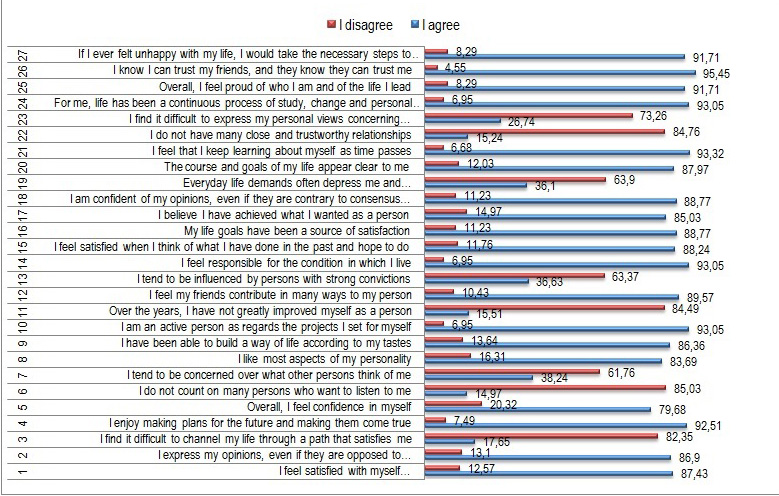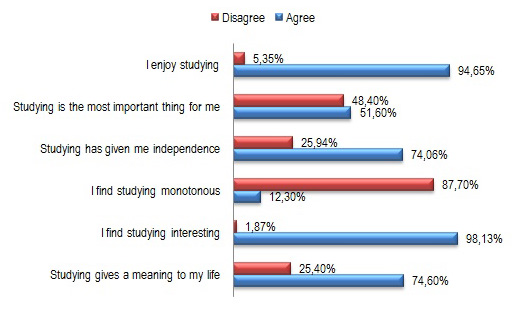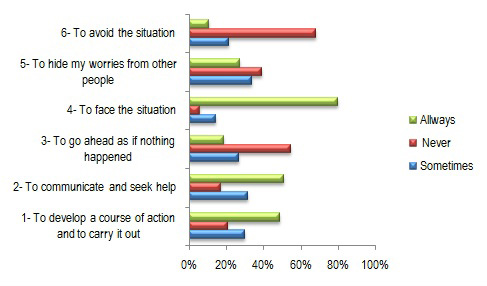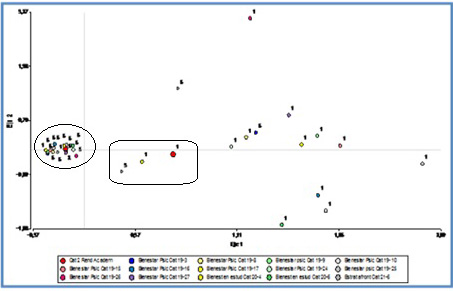ARTÍCULOS ORIGINALES
Relationship between
academic performance, psychological well-being, and coping
strategies in medical students
Relación entre rendimiento académico, bienestar psicológico
y estrategias de afrontamiento en estudiantes de la carrera
de medicina.
Silvina M. Trucchia, Marcela S. Lucchese, Julio E. Enders,
A. Ruth Fernández.
Revista Facultad de Ciencias Medicas 2013; 70(3):144-152
Admission Departament, School
of Medicine (SM) - Universidad Nacional de Córdoba (UNC)
Silvina M. Trucchia, Admission Departament, SM,UNC.
Department of Medical Anhropology. SM, UNC
Marcela S. Lucchese, Admission Departament, SM, UNC
Julio E. Enders, Admission Departament, SM, UNC
A. Ruth Fernández. Admission Departament, SM, UNC.
Mail:
Silvina M. Trucchia. Enrique Barros s/n. Phone (0351)
4334272/ 4334266- e-mail:
silvinatrucchia@yahoo.com.ar
Introduction
The etiology of the problems related to the academic
performance of university students is complex and includes
various personal, academic and sociocultural factors1, which
are evident from the early years of study. When these
factors remain unsolved, they tend to affect the
psychological integrity of students, who evince loss of
concentration, emotional troubles, low academic performance,
and poor productivity2, among other problems. This study
aims at identifying the level of psychological well-being
and the coping strategies used by medical students in the
Basic Cycle to deal with academic situations that are
perceived as stressors, such as excessive academic pressure,
examination anxiety, and class participation. A closely
related objective is to analyze the relationship among
psychological well-being, coping and academic performance.
Materials and Methods
The subjects of this study were taken from the student
population of the Basic Common Cycle of studies leading to
an MD degree in the School of Medicine of the National
University of Córdoba, Argentina, during the academic year
2010, i.e. students from the first, second and third years
who were selected through multistage sampling by subject and
academic level. The strata comprise students enrolled in the
following subjects: Medical Anthropology (first year),
Psychosocial Medicine (second year) and Community Health III
(third year). Using simple random sampling for each stage, a
total of 374 complete records of voluntary answers was
obtained. Ethical protection was granted for all data
provided by the students. The questionnaire, called
“Questionnaire on determiners of academic performance”, was
prepared on the basis of various related instruments that
were revised to obtain a version specifically designed for
this study3-8, which is observational and
transversal. The questionnaire was validated, in the first
stage of the study, by an analysis using the alpha Cronbach9
coefficient, for which a value of 0.79 was obtained. The
instrument consists of 22 questions, some of them
dichotomous and others of the multiple-choice type,
enquiring about social and personal determiners that may
affect students’ academic performance. The study analyzes
students’ perceptions of their general psychological well-being,
academic well-being, and coping strategies. As regards
psychological well-being, 27 items were related to subjects’
perception of well-being in such matters as level of
autonomy, mastery of environment, situation control, self-acceptance,
and life goals (agree / does not agree); besides, 6 items
enquire about academic well-being, including statements on
correspondence between expectations and actual academic
achievements, such as “I find studying interesting”, “I find
studying monotonous”, “Studying is important for me”, “I
enjoy studying” (agree / does not agree). As regards coping
strategies, the questionnaire includes 6 items that enquire
about protective behaviors against stressful events. The
questionnaire items facilitate determination of the
frequency of use of coping strategies and their nature:
whether they focus on the situation, problem solving,
communication, help seeking, avoidance, or denial (never /
sometimes / always). Data on individual students’ academic
performance for the 2010-2012 period was obtained from the
Students Office database of the School of Medicine, i.e. the
grade point averages based on a scale of 1 to 10. The marks
spanned the examinations dates from February 2010 through to
December 2012. The marking scale groups students as follows:
those having a performance in the range of 1 to 3.99 (termed
“Insufficient”), those having 4 to 5.99 (termed “Regular”),
those having 6 to 7.99 (termed “Good”), and those having 8
to 10 (termed “Very Good”). Following a preliminary analysis,
students were regrouped in two strata: those having a
“Good-Very Good (G/VG)” performance, and those having a
“Regular-Insufficient (R/I)” performance; these variables
indicate student performance and facilitate student profile
characterization. Statistical data processing was first
carried out using bivariate categorical data analysis (adjusted
Chi-square test), with a significance level of p < 0.05 for
all cases, and later using a multiple correspondence
factorial analysis, which permitted an extension of the
categorical analysis of the recorded variables. This
multivariate technique facilitated the generation of
profiles for all students on the basis of the indicators
that were rendered significant by the bivariate analysis.
Results
The questionnaire was given to 374 students enrolled in
the first, second, and third years of the School of
Medicine. The mean age of the students in the sample was 20
years, within a range of 17 to 35 years. 65% of students
were female and 35%, male. Comparing the mean age of the
groups stratified by gender, it was noted that the mean for
the females was lower than the corresponding to males,
namely 20.05 ± 0.12 and 20.66 ± 0.21, respectively, (p <
0.0069).
The perception of psychological well-being by students at
the time of answering the questionnaire was 86% positive; it
must be taken into account that the questions enquired about
level of autonomy, mastery of environment, situation
control, self-acceptance, and life goals (Figure 1).
 |
Figure 1. Distribution of the total of medical students who
have answered the questionnaire in the SM,
according to psychological well-being (n=374) |
The analysis of the relationship between “Psychological Well-being”
and “Academic Performance”, in the evaluation of item 3, “I
find it difficult to channel my life through a path that
satisfies me”, revealed a prevalence of students with “R/I
academic performance” over those with “VG/G academic
performance” (p<0.0007). In the evaluation of the items “I
like most aspects of my personality” (item 8), “I have been
able to build a life according to my tastes” (item 9), “I am
an active person as regards the projects I set for myself” (item
10), “My life goals have been a source of satisfaction
rather than a source of frustration for me” (item 16), “I
believe I have achieved what I wanted as a person” (item
17), “Overall, I feel proud of who I am and of the life I
lead” (item 25), and “If I ever felt unhappy with my life, I
would take the necessary steps to change it” (item 27), a
higher frequency of choice was found in students with “VG/G
academic performance” than in students with “R/I academic
performance” (p<0.0150, p<0.0152, p<0.0001, p<0.0433,
p<0.0452, p<0.0011, and p<0,0230, respectively).
In the analysis by course year, for the items “For me, life
has been a continuous process of study, change and personal
growth” (item 24) and “If I ever felt unhappy with my life,
I would take the necessary steps to change it” (item 27),
first-year students with “VG/G academic performance”
prevailed over those with “R/I academic performance”
(p<0.0288 and p<0.0330, respectively). As regards the items
“I am an active person as regards the projects I set for
myself” (item 10), “I feel satisfied when I think of what I
have done in the past and hope to do in the future” (item
15), and “Overall, I feel proud of who I am and of the life
I lead” (item 25), second-year students with “VG/G academic
performance” prevailed over those with “R/I academic
performance” (p<0.0223, p<0.0405, and p<0.0223, respectively).
When comparing item 25, “I feel proud of who I am and of the
life I lead” across course years, in the group with “VG/G
academic performance”, students of first and third year
showed prevalence over those of second year (p<0.0001 and
p<0.0001, respectively). As regards academic psychological
well-being, students answered “I enjoy studying”, “I find
studying interesting”, “Studying gives a meaning to my life”,
and “Studying has given me independence” (Figure 2).
 |
Figure 2. Distribution of the total of medical students who
have answered the questionnaire,
according to academic well-being (n=374) |
When analyzing the relationship between psychological well-being
and academic performance for all the subjects of the study
it was found that “I enjoy studying” (item 6) prevailed in
students with “VG/G academic performance” over those with
“R/I academic performance” (p<0.0332).
Coping Strategies
The Coping strategies most commonly resorted to by the
subjects of the study in the face of problematic situations
are “To face the situation”, “To develop a course of action
and to carry it out”, and “To communicate and seek help”
(Figure 3).
 |
Figure 3. Distribution of the total of medical students who
have answered the questionnaire in the SM,
according to Coping strategies (n=374) |
No associations were observed between “Academic performance”
and “Coping strategies” in students of the first and second
years. However, the analysis showed that item 6, “To avoid
the situation”, in third year students of the group “R/I
academic performance” prevailed over those with “VG/G
academic performance” (p<0.0455). The multiple
correspondence analysis aimed at determining the level of
association between “Academic performance” and perception of
“Psychological well-being” and “Coping strategies” revealed
two factors that define students’ profiles. The first factor
indicates the relationship between “VG/G academic
performance” with the perceptions of “I am an active person
as regards the projects I set for myself”, “I have been able
to build a way of life according to my tastes”, “I like most
aspects of my personality”, “Overall, I feel proud of who I
am and of the life I lead”, and “I feel satisfied when I
think of what I have done in the past and hope to do in the
future”, “If I ever felt unhappy with my life, I would take
the necessary steps to change it”, “To face the situation”.
On the other hand, “R/I academic performance” is associated
with the perceptions “dissatisfaction with one’s personality”
and “tendency to avoid problematic situations” (Figure 4).
 |
Figura 4. Visualization of factors associated with academic
performance with reference to perception of psychological
well-being and to coping strategies for problematic
situations in medical students who have answered the
questionnaire in the SM. |
Ref: 1. Regular-Insufficient academic performance;
Psychological well-being Cat. 19-8 (I like most aspects of
my personality); Coping Strategies Cat. 21-6 (To avoid the
situation); 2. Academic performance Very Good-Good;
Psychological well-being Cat. 19-15 (I feel satisfied when I
think of what I have done in the past and hope to do in the
future); Psychological well-being Cat. 19-26 (I know I can
trust my friends, and they know they can trust me);
Psychological well-being Cat. 19-27 (If I ever felt unhappy
with my life, I would take the necessary steps to change it);
Psychological well-being Cat. 19-24 (For me, life has been a
continuous process of study, change and personal growth);
Psychological well-being Cat. 19-9 (I have been able to
build a life according to my tastes); Psychological well-being
Cat. 20-4 (Studying has given me independence.)
Discussion
The high levels of well-being found in the subjects of this
study are similar to those found by Villaseñor-Ponce
(2010)10, who maintains that the high satisfaction evinced
by the subjects he studied is due to their being satisfied
with their achievements up to the time of the study10. In a
study carried out in Spain, Cabanach and Col. (2008) agree
that “the perception of having the resources required for
coping with academic demands fosters student’s learning
motivations, psychological adjustment and, as a result,
higher levels of well-being”11.
The association that was found between “psychological well-being”
and “academic performance” in students with “VG/G academic
performance”, who evinced a higher level of satisfaction and
well-being compared to those with “R/I academic performance”,
agrees with the findings of other research studies that find
a positive association between academic engagement –understood
as a state of well-being defined by high levels of
concentration– and commitment to study, whose relationships
are established with variables such as gender, age, self-efficacy,
life satisfaction and performance12-14. Moreover, a
relationship has also been established between levels of
satisfaction and academic achievement (mediated by
motivation), effectiveness, and success expectations13,15.
In relation to this, the study performed by Contreras and
Col. (2008), in Colombia, indicates that the commitment,
determination and satisfaction perceived by the student in
his academic work are facilitators of a good academic
performance, and that some of the factors that influence
academic failure are concentration and comprehension
problems, plus emotional components related to learning,
such as poor motivation, lack of self-confidence, low
tolerance to frustration, fear of future, and fear of making
decisions and of making mistakes16. The association found in
our study between psychological discomfort –namely, the
perception of high levels of stress and continuous tension,
loss of self-confidence, and lesser ability to face problems
and make decissions17 – and lower academic performance, low
grade point average, and less satisfaction with the course
of studies has also been observed in young university
students of Nursing in Spain18 and Chile19. Another aspect
that has been analyzed is the presence of “Academic
psychological well-being” in students with “VG/G academic
performance”, as can be observed in previous research
studies that have confirmed the relationship between
satisfaction and enjoyment experienced by students in their
learning processes and academic achievement13,16.
Also, our preliminary data analysis revealed that the
“Coping strategies” used by the subjects of this study to
face problematic situations may be ordered by decreasing
frequency as follows: “To face the situation”, “To develop a
course of action and to carry it out”, “To communicate and
seek help”, “To go ahead as if nothing happened”, and “To
avoid the situation”. These findings reveal that students
have a tendency to use more frequently those strategies that
focus on problem solving, coping with the situation or
preparing a course of action to solve it, than passive
strategies focused on emotional control. Similar results
have been obtained by studies which found that problem
solving, help seeking, and avoidance are the most frequent
strategies used by young university students20-22, 15. In
short, our study reports that, to face situations arising
from academic requirements, students use “Coping strategies”
that contribute to “problem solving”; this indicates that
students perceive that, through a direct and behavioral type
of coping, they have the ability to modify the situation, to
look for possible solutions and to carry out actions that
may alter the source of stress and overcome the problem.
Other students, on perceiving themselves as unable to meet
satisfactorily some concrete demands and their associated
stress, assume, as coping approaches, “behaviors that entail
escapism or avoidance”. With reference to this, some
researchers point out that persons with medium to high
levels of anxiety resort to escapism and avoidance when
facing academic work23,24.
World education research that has characterized the coping
strategies used by university students in dealing with
stressing academic situations, supports the relationship
between coping and performance, since appropriate and
effective coping strategies would tend to promote a better
adaptation of the student and a higher academic
performance20,22. Thus, the relationship between coping and
academic performance has been reported in studies that
maintain that students who cope with academic stress tend to
evince a better performance, whereas those who ignore it
tend to evince lower performance25. Similar results are
reported in a study carried out with students of the School
of Medicine of Akdeniz University, in Turkey, which found a
relationship between academic performance and coping focused
on problem solving. Therefore, students who use coping
strategies focused on problem solving combined with self-confidence
have a better adaptation to the demands of academic
environments and present higher levels of academic
satisfaction and achievement26. The results of our study
lead to the conclusion that a majority of subjects evince
psychological well-being. Thus, academic performance of
students is associated with psychological well-being,
perception of autonomy, situation control, self-acceptance
and satisfaction with achievements. When facing situations
that generate concern, students tend to use more frequently
strategies focused on “problem solving”, “facing the problem
or preparing a course of action to overcome it”. Students
with “VG/G academic performance” have a perception of
themselves as “persons who are able to reach the goals they
set for themselves”, and state that they “feel satisfied
with the characteristics of their personalities”, “are proud
of being who they are and of the life they lead”, “are
satisfied with their achievements to date, able to change
readily those situations which are deemed unsatisfactory”
and “face situations which create concern”. On the other
hand, “R/I academic performance” is associated with
“dissatisfaction with characteristics of their personality”
and a “tendency to avoid situations that generate concern”.
Based on these findings and taking into account the personal
and academic characteristics of students who are immersed in
the current academic environment, it will be possible to
develop actions aimed at accompanying and facilitating their
adaptation and adjustment to the academic requirements of
higher education; these actions would also act as a boosting
element for student performance.
El presente estudio no
presenta conflictos de intereses y está encuadrado en el
marco del Proyecto de Investigación “Los Ciclos de
Nivelación de las Carreras de la Facultad de Ciencias
Médicas: un abordaje a los procesos evaluativos y su
relación con el rendimiento académico de los alumnos”. FCM.
UNC. Director: Dra. Mgter Marcela Lucchese. Entidad
otorgante Secyt. Inicio 2010.
References
1. Alonso P. & Lobato H. Elementos que influyen en el
fracaso universitario un estudio descriptivo. REOP. Revista
Española de Orientación y Psicopedagogía. 2005; 16
(1):63-79.
pdf
2. Fergusson E, James D, Madeley L. Factors associated with
success in medical school: systematic review of the
literature. BMJ. 2002; 324:952-957.
PubMed -
pdf
3. Pérez E. & Delgado M. Inventario de autoeficacia para el
estudio. Desarrollo y validación inicial. Avaliação
Psicológica. 2006; 5 (2):135-143.
pdf
4. Barraza Macías A. Validación del inventario de
expectativas de autoeficacia académica en tres muestras
secuenciales e independientes. Revista de Investigación
Educativa. 2010; 10:1-30.
pdf
5. Van Dierendonck D. The construct validity of Ryff’s Scale
of Psychological well-being and its extension with spiritual
well-being. Personality and Individual Differences. 2004; 36
(3):629-644.
Full text
6. Ryff C. Happiness is everything, or is it? Explorations
on the meaning of psychological well-being. Journal of
Personality and Social Psychology, 1989; 57 (6):1069-1081.
Abstract
7. Sánchez-Canovas J. Escala de Bienestar Psicológico. 2da
ed. TEA Ed: Madrid, España. 2007. 51 p.
8. Bellón J, Delgado A, Luna J, Lardelli P. Validez y
fiabilidad del cuestionario de apoyo social funcional Duke-UNC-11.
Atención Primaria. 1986; 18: 153-63.
9. Oviedo H. y Campos Arias A. Aproximación al uso del
coeficiente alfa de Cronbach. Rev. Colombiana de
Psiquiatría. 2005; 4:572-580.
Scielo
10. Villaseñor-Ponce M. Correlación entre ansiedad y
bienestar psicológico en estudiantes que ingresan a la
universidad. Revista Mexicana de Psicología Educativa (RMPE).
2010; 1(1), 41-48.
pdf
11. Cabanach R, Valle A, Rodríguez S, Piñeiro I, González P.
Las creencias motivacionales como factor protector del
estrés en estudiantes universitarios. European Journal of
Education and Psychology. 2010; 3, (1):75-87.
pdf
12. Bresó E, Llorens S. & Salanova M. Creencias de eficacia
académica y engagement en estudiantes universitarios.
Jornades de Foment de la Investigació. 2005. 7 p.
pdf
13. Caballero C, Abello R, Palacio J. Relación del burnout y
rendimiento académico con la satisfacción frente a los
estudios. Avances en Psicología Latinoamericana. 2008; 25
(2), 98-111.
Scielo
14. Salanova M, Schaufeli W, Martinez I, Breso E. How
obstacles and facilitators predict academic performance: The
mediating role of study burnout and engagement. Anxiety,
Stress, & Coping; 2009; 26:1-18.
PubMed
15. Palacio J, Caballero C, González O, Gravini M, Contreras
K. Relación del burnout y las estrategias de afrontamiento
con el promedio académico en estudiantes universitarios.
Universitas Psychologica. 2012; 11 (2):535-544.
16. Contreras K, Caballero C, Palacio J, Pérez A. Factores
asociados al fracaso académico en estudiantes universitarios
de Barranquilla (Colombia). Psicología desde el Caribe.
Universidad del Norte. 2008; 22:110-135.
Scielo
17. Espíndola J, Morales F, Díaz E, Pimentel P, Henales C.
et al. Malestar psicológico: algunas de sus manifestaciones
clínicas en la paciente gineco-obstétrica hospitalizada.
Perinatol. Reprod. Hum. 2006; 20 (4):112-122.
pdf
18. Zupiria X, Huitzi X, Alberdi M, Uranga M, Eizmendi I.
et. al. Stress sources in nursing practice. Evolution during
nursing training. Nurse Educ Today. 2007; 27 (7):777-787.
PubMed
19. Herrera L. y Rivera M. Prevalencia de malestar
psicológico en estudiantes de enfermería relacionada con
factores sociodemográficos, académicos y familiares. Ciencia
y enfermería. 2011; 17 (2):55-64.
Scielo
20. Cornejo M. & Lucero M. Preocupaciones vitales en
estudiantes universitarios relacionados con el bienestar
psicológico y modalidades de afrontamiento. Fundamento de
Humanidades. 2005: 6 (12):143-153.
pdf
21. Martínez I. & Marques A. Burnout en estudiantes
universitarios de España y Portugal y su relación con
variables académicas. Revista Aletheia. 2005; 21:21-30.
22. Park C. & Adler N. Coping style as a predictor of health
and well-being across the first year of Medical School.
Health Psychology. 2003; 22 (6):627-631.
PubMed
23. Valle A, Núñez J, Cabanach R, Rodríguez S, González-Pienda
J. et. al. Perfiles motivacionales en estudiantes de
Secundaria: Análisis diferencial en estrategias cognitivas,
estrategias de autorregulación y rendimiento académico.
Revista Mexicana de Psicología. 2009; 26:113-124.
pdf
24. Rojas E. La Ansiedad. Ed. Booket. Buenos Aires.
Argentina. 2005. 205 p
25. Martínez González J. Estrategias de afrontamiento ante
el estrés y rendimiento académico en estudiantes
universitarios. Cuadernos de Educación y Desarrollo. 2010; 2
(18)
Full text
26. Alimoglu M, Gurpinar E, Mamakli S, Aktekin M. Ways of
coping as predictors of satisfaction with curriculum and
academic success in medical school. Adv Physiol Educ . 2011;
35 (1):33-38.
PubMed
|